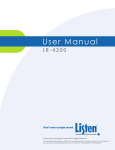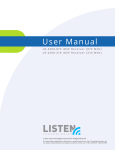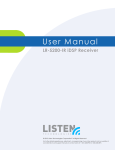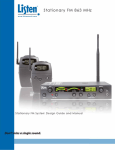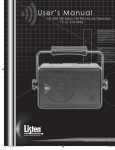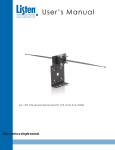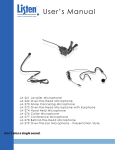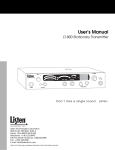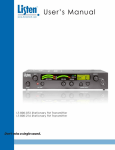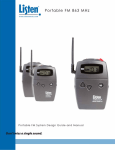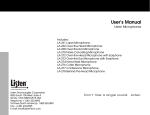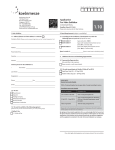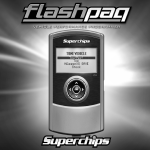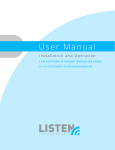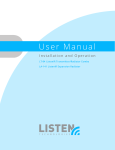Download User Manual
Transcript
User Manual LR-5200-072 Advanced iDSP Receiver (072 MHz) LR-5200-216 Advanced IDSP Receiver (216 MHz) © 2015 Listen Technologies Corporation® All Rights Reserved l For further details regarding use, adjustment, orEprogramming our website at www. LR -5200 R C E I V E R of Myour A NListen U A Lproducts visit PAGE 0 listentech.com/support-manuals or contact Listen at +1.801.233.8992 or 1.800.330.0891. Dear Valued Customer, Thank you for choosing Listen! We are dedicated to providing you with the highest quality products available, and take pride in delivering outstanding performance to ensure you are completely satisfied. We independently certify each of our products to the highest quality standards and back them with a limited lifetime guarantee. We are available to answer any questions you might have during installation or in the operation of our products. At Listen, it’s all about you, should you have any comments or suggestions we’re here to listen. Here’s how to reach us: +1.801.233.8992 +1.800.330.0891 North America +1.801.233.8995 fax [email protected] www.listentech.com Thank you and enjoy your listening experience! Best regards, Russell Gentner and the Listen Team • In the few instances where repairs were needed, 99% of all clients indicated that they were happy with repair turn-around-times and 85% of the time, clients were without their product for less than 10 days! • Overall client satisfaction of working with Listen was rated 4.8 out of 5. • “Please continue with your excellent attitude toward customer satisfaction. You guys are great!” • “I’ve never had such good service from any company. Keep up the good work!” • “You stand behind your product wonderfully.” PAGE 1 l LR-5200 RECEIVER MANUAL TABLE OF CONTENTS iDSP™ Receivers………………………………………………………………………………………………………………………………………… 3 LR-5200 Quick Reference…………………………………………………………………………………………………………………………… 4 LR-5200 Specifications……………………………………………………………………………………………………………………………… 5 Safety Cautions!………………………………………………………………………………………………………………………………………… 6 Hearing Safety:………………………………………………………………………………………………………………………………………… 6 Medical Device Safety:………………………………………………………………………………………………………………………… 6 Recycling :………………………………………………………………………………………………………………………………………………… 6 Product Recycling Instructions:…………………………………………………………………………………………………………… 6 Battery Recycling Instructions:…………………………………………………………………………………………………………… 6 Quick Setup and Operation Instructions:…………………………………………………………………………………………………… 7 1. Unpack Unit………………………………………………………………………………………………………………………………… 7 2. Activate Battery…………………………………………………………………………………………………………………………… 7 3. Charge Battery……………………………………………………………………………………………………………………………… 7 4. Connect Ear Phone……………………………………………………………………………………………………………………… 8 Using The Neck Loop Lanyard………………………………………………………………………………………………………8 Using The 3.5mm Headset Extension Cable…………………………………………………………………………………8 5. Turn the Unit On………………………………………………………………………………………………………………………… 9 6. Programmable Channel Select (Listen Button)……………………………………………………………………………9 7. Channel Select Mode………………………………………………………………………………………………………………… 10 Automatic Channel Selection………………………………………………………………………………………………………………… 11 Manual Channel Selection……………………………………………………………………………………………………………………… 11 Seek Mode……………………………………………………………………………………………………………………………………………… 12 Disabled………………………………………………………………………………………………………………………………………………… 13 Listen Button Block………………………………………………………………………………………………………………………………… 13 Adjust Volume………………………………………………………………………………………………………………………………………… 14 Battery & Belt Clip…………………………………………………………………………………………………………………………………… 15 Low Battery Indication……………………………………………………………………………………………………………………… 15 Belt Clip Installation/Removal………………………………………………………………………………………………………… 15 Accessing Battery Compartment……………………………………………………………………………………………………… 16 Reset to Factory Default Settings……………………………………………………………………………………………………… 16 Advanced Program Features an Listnen’s UI Configuration Software……………………………………………………… 17 Super Quiet Mode…………………………………………………………………………………………………………………………… 17 Squelch…………………………………………………………………………………………………………………………………………… 18 Basic Channels and Expanded Channels Modes……………………………………………………………………………… 18 Channel Labels………………………………………………………………………………………………………………………………… 18 Auto Power Mode…………………………………………………………………………………………………………………………… 18 Unit ID……………………………………………………………………………………………………………………………………………… 19 Brightness Control…………………………………………………………………………………………………………………………… 19 Jack Sense………………………………………………………………………………………………………………………………………… 19 Unit Information……………………………………………………………………………………………………………………………… 19 Reset to Factory Defaults………………………………………………………………………………………………………………… 19 Firmware Update……………………………………………………………………………………………………………………………… 19 RF Reception Maximization Strategies:…………………………………………………………………………………………………… 20 72 MHz Compatibility Chart:…………………………………………………………………………………………………………………… 21 216 MHz Compatibility Chart:………………………………………………………………………………………………………………… 22 Troubleshooting LR-5200 Receivers:……………………………………………………………………………………………………… 23 Compliance Notice and FCC Statement…………………………………………………………………………………………………… 24 Warranty………………………………………………………………………………………………………………………………………………… 25 Contacting Listen…………………………………………………………………………………………………………………………………… 26 LR-5200 RECEIVER MANUAL l PAGE 2 iDSP™ Receivers The LR-5200 is a powerful Assistive Listening Receiver designed to be compact and simple to use. The unique design of the iDSP™ receiver family allows them to be worn as a necklace, using the belt clip or concealed in a pocket, making this the most inconspicuous ALS receiver on the market. Headset Earbuds Hearing Aid T-Coil Ear Speaker Ear Phone/ Neck Loop Lanyard Belt Clip Extension Cable Each receiver can be purchased with a Ear Phone/Neck Loop Lanyard that is designed to hold the receiver like a necklace similar to the Blue Tooth™ transceivers used with many of the today’s hearing aids. The Ear Phone/Neck Loop Lanyard can be used as the induction loop for those users who have T-coil enabled hearing aids or cochlear implants, inducing the received audio directly into these T-coil enabled devices. The Ear Phone/Neck Loop Lanyard also provides the connection to Listen’s Universal Ear Speaker, Earphones and Headphones, incorporating a short connection cable that plugs directly into the Ear Phone/Neck Loop Lanyards 3.5mm headset jack located 2/3 of the way up the lanyard. A second 3.5mm extension cable provided with Listen’s universal earphones provides the length of cable required to place the receiver in a pocket or using the belt clip. PAGE 3 l LR-5200 RECEIVER MANUAL LR-5200 Quick Reference 3. Up/Down Volume Control 1. OLED Display Area 4. Programmable Channel Select 2. Micro USB 1. OLED Display Area: Displays battery status, unit ID, channel status, volume status and charge activation 2. Micro USB: USB charging, programming, firmware updates and inventory dispensing 3. Up/Down Volume Control: Press momentarily to adjust the volume up/down or press and hold to ramp the volume. Note: Press and hold both up and down buttons for 5 seconds to activate channel select, use up and down to change the channel. Press power to save and exit 4. Programmable Channel Select: Cycle through active channels, seek to or lock to a channel. 8. Power On/Off 5. 3.5 mm Output Jacks 9. LED 6. Belt Clip 10. Battery Protective Pull Tab 7. Charging Contact 11. Battery Door 5. 3.5 mm Output Jacks: Connect Listen Ear Phone/Neck Loop Lanyard for use with T coil hearing aids or with Universal Ear Speaker or Headphone. 6. Belt Clip: To remove, remove screw and pull belt clip from unit. To install place belt clip in place and insert screw. 7. Charging Contact: For use with Listen charging tray options. 8. Power On/Off: Press and hold for 1 second to turn on. Press and hold for 3 seconds to turn off. 9. LED: Indicates low battery condition and charging status 10. Battery Protective Pull Tab: Remove clear plastic pull tab to activate internal battery connections. 11. Battery Door: Can be removed to access battery and product labeling information. LR-5200 RECEIVER MANUAL l PAGE 4 LR-5200 Specifications Product Specification: LR-5200-072 / LR-5200-216 Audio System Frequency Response System Signal to Noise Ratio System Distortion Output/s 50 Hz - 15 kHz (±3 dB) / 50 Hz - 10 kHz (±3 dB) SQ enabled 80 dB, SQ disabled 60 dB / SQ enabled 80 dB, SQ disabled 50 dB <2% total harmonic distortion (THD) at 80% deviation Two (2) 3.5 mm (0.14 in.) connectors, unbalanced, 0 dBu nominal output level, 16 mW maximum, impedance 32 ohm Controls User Controls Set-up Controls Programming Power, up/down volume, Listen button for end user channel selection. Press and hold up/down volume buttons for 5 seconds to enter channel adjust, use up/down to select channel Via software and USB port Indicators LED Display Flashes when batteries are low or to indicate charging, solid when fully charged Channel designation,battery level, unit number, charging status RF Frequency Range Number of Channels Sensitivity Frequency Accuracy Antenna Type Squelch 72.025 - 75.975 MHz / 216.0125 - 216.9875 MHz (57)17 wide band, 40 narrow band / (57)19 wide band, 38 narrow band .6uV typical, 1 uV maximum for 12 dB sinad ± .005% stability 32 to 122 ºF (0 to 50 ºC) Uses ear phone/neck loop lanyard and short ear phone cable or standard earphone cable Programmable in 20 steps, automatic on loss of RF signal Power Battery Type Battery Life Battery Charging Time Power Supply Lithium Ion 8 Hours of typical use Fully charged in 2.5 Hours Micro USB connector, 5 V, 500 mA Physical Dimensions (H x W x D) Dimensions with Belt Clip Unit Weight Unit Weight with Batteries Shipping Weight Color 3.75 x 2.0 x 0.64 in. (9.6 x 5.0 x 1.7 cm) 3.75 x 2.0 x 0.80 in. (9.6 x 5.0 x 2.1 cm) 1.6 oz (45.4 g) 2.4 oz (68.1 g) 3.2 oz (90.8 g) with 16 oz (454 g) minimum Flat Black Environmenta Temperature - Operation Temperature - Storage Relative Humidity 14 to 104 ºF (-10 to 40 ºC) (-)4 to 122 °F (-20 to 50 °C) 0 to 95% relative humidity, non-condensing Compliance FCC Part 15, Industry Canada, RoHS PAGE 5 l Standards LR-5200 RECEIVER MANUAL Safety Cautions! Hearing Safety: This product is designed to amplify audio to a high volume level which could potentially cause hearing damage if used improperly. To protect your hearing make sure the volume is turned down before putting on the ear speaker or headphones. Then adjust the volume up to the minimum setting require to hear clearly. Do not allow children or other unauthorized individuals to have access to this product without supervision. Medical Device Safety: Before using this Listen product with an implantable or other medical device, consult your physician or manufacturer of your implantable or other medical device. Always make sure you are using this product in accordance with the safety guidelines established by your physician or the implantable device manufacturer. Recycling : Help Listen Technologies protect the environment! Please take the time to dispose of your equipment properly. Product Recycling Instructions: Please do NOT dispose of your Listen Technologies equipment in the household trash. Please take the equipment to an electronics recycling center; OR, return the product to the factory for proper disposal. Battery Recycling Instructions: Please do NOT dispose of batteries in the household trash. Please take the batteries to a retail or community collection point for recycling. LR-5200 RECEIVER MANUAL l PAGE 6 Quick Setup and Operation Instructions: 1. Unpack Unit Inspect the unit for physical damage. If damage is apparent, please contact Listen Technologies technical support for assistance. 2. Activate Battery Remove the clear plastic pull tab located at the bottom of the battery door, this will activate the internal battery connections. Note: upon first activation the battery will have a limited charge, we recommend the unit be charged immediately. Pull the tab to activate the internal battery 3. Charge Battery Fully charge the rechargeable Lithium Ion battery by connecting the unit to one of Listen Technologies charging options. a. b. c. d. e. LA-380 Intelligent 12-Unit Charging/Carrying Case LA-381 Intelligent 12-Unit Charging Tray LA-421 1-Port USB Charger (comes with cable) LA-423 4-Port USB Charger (comes with 4 cables) LA-422 USB to Micro USB cable (Connects iDSP™ receiver to any standard USB port) When connected to a charging option the OLED status display will show the battery charge Icon momentarily and the status LED next to the power button will begin to flash indicating that the unit is charging. OLED Display: Status LED: Charging Icon when first connected to a charging source Flashes during charging Indicated Unit #, Charge % and Channel Assignment when removed for charging Solid when charge is complete When the unit reaches 100% charged the status LED next to the power button will stop flashing and will be solid. PAGE 7 l LR-5200 RECEIVER MANUAL 4. Connect Earphone Ear Speaker Using The Earphone/Neck Loop Lanyard Connect the Listen Intelligent ear phone/neck loop lanyard to the two 3.5 mm output jacks on the unit. Then connect the short cable ear speaker or headphones to the 3.5mm output jack on the lanyard. The lanyard neck loop is placed over the head and worn as a necklace. Ear Phone/ Neck Loop Lanyard Headset This is the preferred method of wearing the receiver for best performance! For T-coil compatible hearing aid use simply disconnect the ear speaker or headset from the ear phone/neck loop lanyard. Earbuds Using The 3.5mm Earphone Extension Cable If the receiver is to be clipped to a belt, waistband or inside a pocket a long extension cable is used. Connect the extension cable to the ear speaker, headset or earphones, then connect the extension cable into one of the 3.5 mm output jacks on top of the receiver. Ear Speaker Headset Extension Cable Earbuds LR-5200 RECEIVER MANUAL l PAGE 8 5. Turn the Unit On Press and hold the Power Button for 1 second to turn the receiver on, the unit display will show the unit ID, battery status and the current channel. Each item will be displayed and then the display will turn off. OLED Display: Power Button: Indicates Unit #, Charge % and Channel Assignment when power button is pressed Press and hold for 1 second to turn on, press and hold for 3 seconds to turn off #123 To view the unit ID, battery status or channel while the unit is powered, momentarily press the power button. To turn the receiver off, press and hold the power button for 3 seconds. 6. Programmable Channel Select (Listen Button) The main advantage of the LR-5200 Receiver is the functionality of the programmable Listen Button. The Listen Button can be programmed for Channel Select Mode, Seek Mode or be Disabled. These modes can only be change via the IDSP Software Suite. Note: In order for the LR-5200 to receive audio it must be on the same channel as a transmitter in the facility. 72 MHz receivers operate on 17 wide band channels and 40 narrow band channels. Channels represented by letters on the display (i.e. A) are wideband channels; channels represented by numbers are narrowband channels. Listen recommends the use of wide band channels for a much higher quality listening experience. 216 MHz receivers operate on 19 wide band channels and 38 narrow band channels. Channel numbers starting with a “2” are wide band; channels beginning with a “1” or “3” are narrow band channels. It is important to choose channels that are free from interference to achieve proper operation of your Listen equipment. This process is trial and error. Before turning on the transmitter, listen for interference on the available channels. Choose channels with the least amount of interference. If you are using multiple channels follow this process: PAGE 9 l LR-5200 RECEIVER MANUAL CH E 1. Channel Select: (Listen Button) Same Space If you are using transmitters in the same space, the most number of channels that will work simultaneously is six wide band channels or 8 narrow band channels at 72 MHz, three wide band channels or 5 narrow band channels at 216 MHz. With all of the transmitters off, listen for interference on all the wide band channels via the headphone jack. Using the frequency compatibility tables on pages 21-22, eliminate any channels that have noticeable interference. Now choose the channels with the widest channel spacing. It is recommended that adjacent channels be spaced at least 300 KHz. If there is no interference the following channels are recommended: A, C, E, I, J, and H (wide band) or 1, 5, 10, 16, 21, 24, 31, and 35 (narrow band) for 72 MHz and 2A, 2K, and 2V (wide band) or 1A, 1C, 1F, 1N, and 1V (narrow band). Distributed Spacing If you are using transmitters that are spread out over space, you can achieve more simultaneous broadcast channels. However, it is critical that your receiver(s) be located as close to its transmitter as possible. You can use adjacent channels (see frequency compatibility tables on pages 21-22) in this case as long as the adjacent channel transmitter is at least 50% further away from the receiver as its transmitter. Example: The transmitter for the receiver on channel E is 100 feet from the receiver. The adjacent channel transmitter on channel D should be at least 150 feet away. Channel Select Mode The Listen Button on your receiver has been programmed from the factory for Channel Select Mode. This mode is especially useful for applications where users are required to select between active channels (such as language interpretation or multiple classrooms), and you don’t want them to have to go through all available channels to find the appropriate channel. In this mode the button can be programmed to increment only through the desired active channels in your facility and lock out all the other unused channels. In this mode when the Listen Button is pressed the unit will increment through the channel list to the next programmed channel. For example if there are three channels programmed (English, Spanish and German) and the unit is on the English and the button is pressed the unit will switch to Spanish. If the button is pressed again the unit will switch to German and an additional press will take the unit back to English again. There are two modes to customize the channel list for the Listen Button. The two modes are Automatic Channel Selection and Manual Channel Selection. These modes can be programmed using the unit or via the IDSP Software Suite. Your Listen receiver has been shipped to you with the Automatic Channel Selection, Auto 2 (channels E and A) enabled for 72MHz or (channels 2C and 2V) enabled for 216 MHz. LR-5200 RECEIVER MANUAL l PAGE 10 1. Automatic Channel Selection In the Automatic Channel Selection mode the user decides how many channels of audio are to be received by the unit. In this mode the unit automatically selects the channels that can be used together simultaneously in a given space. The unit is defaulted to Auto 2. The max number of channels is 8 for 72 MHz and 5 for 216 MHz. 3. Save/Exit: 1. Auto Select Mode: Press and hold the Power and Up button simultaneously for 3 seconds Press power button to save and exit. 2. Scroll Up/Down: Auto 2 Use the up or down button to scroll through available channels 72 MHz Auto 1 (Channel E) Auto 2 (Channels E, A) Auto 3 (Channels E, A, H) Auto 4 (Channels E, A, H, I) Auto 5 (Channels E, A, H, I, J) Auto 6 (Channels E, A, H, I, J, C) Auto 7 (Channels 1, 5, 10, 16, 21, 24, 31) Auto 8 (Channels 1, 5, 10, 16, 21, 24, 31, 35) 216 MHz Auto 1 (Channel 2C) Auto 2 (Channels 2C, 2V) Auto 3 (Channels 2A, 2C, 2V) Auto 4 (Channels 1A, 1F, 1N, 1V) Auto 4 (Channels 1A, 1C, 1F, 1N, 1V) The user selects the number of channels by using the following sequence. Simultaneously press and hold the UP and POWER button for 3 seconds. The unit will display “Auto 2” on the display. Press the UP/DOWN button for the number of desired channels. Momentarily press the POWER button to save the setting or after 5 seconds of no activity the setting is saved and the unit returns to normal operation. Or use the IDSP Software Suite for set up! 2. Manual Channel Selection In the Manual Channel Selection mode the user decides specifically which channels are to be received by the unit. It is recommended that adjacent channels be spaced at least 300 KHz apart if being used simultaneously. 1. Manual Select Mode: Press and hold the Power and Down button simultaneously for 3 seconds The user selects these channels by using the following sequence. PAGE 11 l LR-5200 RECEIVER MANUAL 2. Scroll Up/Down: Manual Use the up or down button to scroll through available channels Simultaneously press and Hold the DOWN and POWER button for 3 seconds. The unit will display “Manual” on the display for 3 second and then displays the current channel. If the channel is used (meaning the Listen Button can select it) the channel will be solid; if not it will flash. Press the LISTEN button for each selected channel to change between “used” (solid) and “not used” (flashing). Press the UP/DOWN button to scroll through all available channels. Momentarily press the POWER button to save and end or after 5 seconds of no activity the setting are saved and the unit returns to normal operation. Note: The IDSP Software Suite can also be used for set up! 1. Channel Select Mode: Press and hold the Power and Up button simultaneously for 3 seconds 4. Save/Exit: Press power button to save and exit. CH E 2. Scroll Up/Down: Use the up or down button to scroll through available channels 3. Channel Select: (Listen Button) Push Listen button to select the channel Once the channels have been selected via the Automatic Channel Selection or the Manual Channel Selection modes a quick change to a specific channel can be made easily. This can be accomplished by the following process: Select the channel to be changed via the Listen Button. Press and hold the volume up and down buttons simultaneously for 5 seconds. The current channel will begin to flash on the display. Use the volume up or down button to scroll through the available channels. Once the desired channel is located momentarily press the power button to save and exit the channel select mode or if no button is pressed for 5 seconds then the selected channel will be saved and the unit will exit the channel select mode. See pages 21-22 for complete channel selection information. Seek Mode Seek Mode is another way to find an active channel in a venue. In the Seek Mode with a press of the Listen Button the unit searches for and locks onto the next active channel in the list of available channels. This mode is useful when users are moving from room to room or may not know which channel to select. In this mode it is possible that the unit will mistake interference for a real broadcast signal. If you get interference, press the Seek Button again. The unit may also stop on a channel that is close to the actual broadcast channel if in the available channel list, in which case the channel will sound noisy or distorted. Simply press Seek again until you find the clearest operating channel. LR-5200 RECEIVER MANUAL l PAGE 12 Disabled When in the disabled mode the Listen Button has no function. Listen Button Lock Once an active channel is found it is sometimes desirable to lock the unit onto the currently tuned channel and not allow the user to make any channel changes. This can be accomplished by pressing and holding the listen button for 5 seconds. When the unit enters locked mode the unit will show the locked symbol on the display for 3 second. When locked, each time the Listen Button is pressed the unit will show the locked symbol on the display for 3 seconds. OLED Display: A closed lock will display. Lock Mode: Press and hold the Listen button for 5 seconds. To unlock the unit simply press and hold the Listen button for 5 seconds. When the unit is unlocked the unit will show the unlocked symbol on the display. OLED Display: An open lock will display. Un-Lock Mode: Press and hold the Listen button for 5 seconds. PAGE 13 l LR-5200 RECEIVER MANUAL Adjust Volume Adjust the listening volume to a comfortable listening level via the volume up/down buttons. v OLED: Indicates the level in a % of maximum level Volume Up/Down 50% Use the volume up or down to raise/ lower volume If the volume is adjusted while there is no audio present the unit will output a momentary tone each time the button is pressed allowing the user to gauge and adjust the audio level to a comfortable listening level. The volume level will be displayed for 3 seconds and then the display will turn off. Note: To protect the users hearing, at power up the receiver will automatically reset to a 25% volume level. Put on a headset and then adjust the volume to a comfortable listening level. LR-5200 RECEIVER MANUAL l PAGE 14 Battery & Belt Clip Low Battery Indication When the unit detects a low battery condition it will cause the status LED to flash slowly indicating that the unit needs to be charged. When the light begins to flash the unit has approximately 30 minutes of receiver use before the unit will turn off. Press and release the power button and the battery charge % will be displayed on the OLED screen temporarily. OLED Display: Status LED: Begins to flash when receiver has less than an estimated 30 minute use left on the charge Press the Power button to get the status of the battery charge life 100% OLED Indicates a % of charge Belt Clip Installation/Removal To remove belt clip, remove screw and pull belt clip from unit. To install place belt clip in place and insert screw. Belt Clip Screw: PAGE 15 l LR-5200 RECEIVER MANUAL Accessing Battery Compartment To access the battery compartment simply remove the belt clip and by pulling down and out on the battery door locking tab. Note: The product labeling information can be found behind the battery and includes the product model number, description, serial number, contact information and compliance statement. Door locking tab Battery door Reset to Factory Default Settings The unit can be returned to its factory default settings at any time by following steps: 1. Turn the unit off 2. Press and hold down the volume down button while pressing and holding the power button for 1 second to turn the unit on 3. Continue to hold down the volume down button while the unit powers on. The OLED display will show the Unit #, Charge Level %, Channel Selection and end with “Reset?” 4. Release the volume down button when Reset is displayed on the OLED display. 5. Press the power button to confirm default is desired. Once pressed the unit will display “Defaulted” on the OLED display. The unit has now returned to the factory default state 6. If 5 seconds lapses before the power button is the pressed, the unit will time out and the unit will not reset to the factory default settings LR-5200 RECEIVER MANUAL l PAGE 16 Advanced Program Features and Listen’s iDSP Software Suite To manage the advanced program features on any of the iDSP™ receivers a windows based User Interface (UI) software is required. This software is available free of charge from Listen Technologies. To download the software log onto http://www.listentech.com/ support/software/idsp-software-suite/ and follow the instructions. With the UI software, direct communication is provided via the Micro USB connection on the receiver. Once connected the UI software provides setup and adjustment of the following functions of the LR-5200 receiver. Note: A help file for the UI software is included with the download and will provide detailed instructions for set up and management of all the advanced program features of the LR-5200 receiver. Super Quiet Mode To reduce background noise and increase the audio quality, Listen offers a noise reduction technology called Listen SQ™. Only Listen *transmitters and receivers have SQ™ available, both the transmitter and receiver must have SQ™ activated to achieve the improved sound quality performance. This LR-5200 receiver has been shipped to you with the SQ™ feature enabled. SQ™ Summary: Improves noise performance by at least 20 dB SQ must be enabled for both the transmitter and receivers SQ™ is NOT Squelch SQ™ is NOT compatible with other manufactures’ products SQ™ can be disabled to permit operation with some early Listen products or other manufactures, products Note: SQ™ is not available on some of the early Listen transmitters. Please contact Listen’s Technical Support team to find out if your existing transmitter has this feature available. Note: If you are planning to use this product with older Listen systems that do not employ SQ™ or another manufactures transmitter The SQ™ mode should disabled on this receiver. Refer to the manual supplied with the downloaded Listen UI software for details on how to manage the SQ™ Mode on this receiver. PAGE 17 l LR-5200 RECEIVER MANUAL Squelch The purpose of squelch is to mute the audio output of the receiver when the signal from the transmitter is turned off or the level is too weak to be received. Without squelch radio noise will be heard in the earphone. The squelch on the receiver can be adjusted to mute the audio at different RF signal strengths. There are 20 squelch settings. The lowest squelch setting (no squelch) is “0” and the tightest squelch setting is “20”. Your Listen receiver has been shipped to you with the squelch setting of 3. Useful as follows: • To ensure that users don’t hear transmissions from other transmitters, set the squelch setting to the highest level that doesn’t squelch the receiver in the defined listening area • If the receiver is to close to the transmitter (i.e. in a classroom), set the squelch high enough so that when the transmitter is turned off it immediately squelches the audio on the receiver and transmitters in other rooms will not be heard • In an area that has a lot of broadcast inference, adjust the squelch setting to a higher setting to ensure the interference is not picked by the receiver • For the maximum amount of range, consider setting the squelch setting to a low level (0, 1 or 2). This expands the range but could allow interference from other transmitters when operating far distances from the primary transmitter Basic Channels and Expanded Channels Modes Your Listen receiver has been shipped with the Basic Channel Mode enabled. In the default Basic Channel Mode, only the wide band channels are available for selection. If the channel desired is not available in Basic Channel Mode, the receiver will need to be set to the Expanded Channel Mode. In Expanded Channel Mode all wide band and narrow band are available for selection. Channel Labels The channel labels are displayed on the OLED status screen. The default is the channel number the receiver has been programmed to receive, i.e. “CH-E”. Customization of this display can be created to better identify the type of audio, for example CH-E could be changed to display “Spanish” if the receiver is used for language translation. Auto Power Mode The auto power mode will automatically power the receiver on when the unit is removed from the charging device, displaying the unit ID, battery status and the active channel. When the unit is returned to the charging device the unit will automatically turn off and resume charging operation. Your Listen receiver has been shipped to you with the Auto Power Mode enabled. LR-5200 RECEIVER MANUAL l PAGE 18 Unit ID The unit ID number provides a unique identification for each receiver that is displayed on the OLED status screen. This can be any 3 digit number between 000 and 999. The unit ID allows venues to track individual units and for easy dispensing and inventory control. Your Listen receiver has been shipped to you with a Unit ID of 000. Brightness Control The Brightness Control adjusts the level of brightness of the OLED display. There are four settings Auto, Bright, Dim and Disabled. In the Auto mode the unit uses an internal light sensor and automatically dims the display when the light level is below approximately 10 Lux. In the Bright, Dim or Disabled mode the unit disables the light sensor and leaves the OLED in the selected Bright or Dim state. In the disabled mode the unit disables the display from lighting during normal operation except for the power on sequence or when the power button is momentarily pressed to check status. The receiver is shipped with the Auto Brightness Control Mode enabled. Jack Sense The jack sense mode when enabled will automatically turn the receiver on when a headset is inserted into the 3.5 mm output jack on the receiver. The receiver will automatically turn off after 60 seconds when the headset is removed from the 3.5 mm output jack. Your listen receiver has been shipped to you with the Jack Sense Mode disabled. Note: If Jack Sense is on and Auto Power is on, the receiver will ignore jack sense while on the charger. Unit Information When a unit is connected to the configuration software the software extracts specific information from the unit and displays it for the user. This information includes the model number, frequency, Serial Number and Firmware Version. Reset to Factory Defaults The unit can be returned to the factory default settings. Firmware Update The firmware update function will check via the internet to see if a firmware update is available for the receiver. PAGE 19 l LR-5200 RECEIVER MANUAL RF Reception Maximization Strategies: For proper and reliable operation, Listen receivers should receive a strong and consistent signal from the originating transmitter. Follow these strategies should be used to maximize this signal: a. When designing and installing a system, keep in mind that the location of both the transmitter and receivers is critical to maximizing signal strength b. Eliminate or minimize obstructions between the transmitter and receivers c. Minimize the distance between the transmitter and receivers d. Move transmitter and receivers away from metal objects e. Place the transmitting antenna as high as possible (on stationary transmitters) f. Orient both transmitting and receiving antennas vertically g. On portable transmitters and receivers, the cable from the microphone or headset is the antenna; ensure that the cable is not coiled or laying horizontal h. For 216 MHz stationary LT-800 transmitter only, consider using a gain antenna such as a Yagi type antenna or the LA-107 ground plane antenna. NOTE: If the RF signal to the 216 MHz models is too high, the audio will be distorted. This may happen if you are within 40 feet (12m) of the LT-800-216 transmitter or within 5 feet (1.5 m) of the LT-700-216 transmitter. CAUTION: When installing remote antennas, ensure the antenna is clear of power lines. Coaxial cable, connectors, and optional antenna mounting kits are available from Listen. Visit www.listentech.com or ask your dealer for details. LR-5200 RECEIVER MANUAL l PAGE 20 72 MHz Compatibility Chart: FrequencyPhonic MHz Listen Ear Comtek Phonak 72.0250 1 1 1 A1 72.0500 72.0750 2 2 2 A2 72.1000 A A A A 72.1250 3 3 3 A3 72.1500 (6) 72.1750 4 4 4 A4 72.2000 K K K K 72.2250 5 5 5 K5 72.2500 72.2750 6 6 6 K6 72.3000 B B B B 72.3250 7 7 7 B7 72.3500 72.3750 8 8 8 B8 72.4000 N N N N 72.4250 9 9 9 N9 72.4500 72.4750 10 10 10 N0 72.5000 C C C C 72.5250 11 11 11 C1 72.5500 72.5750 12 12 12 C2 72.6000 O O O O 72.6250 13 13 13 O2 72.6500 72.6750 14 14 14 4 72.7000 D D D D 72.7250 15 15 15 D5 72.7500 72.7750 16 16 16 D6 72.8000 P P P P 72.8250 17 17 17 P7 72.8500 72.8750 18 18 18 P8 72.9000 E E E E 72.9250 19 19 19 E9 72.9500 72.9750 20 20 20 E0 Williams* Gentner (11, 1) (2) 1 (12, 3) A, (13, 4) 2 (14, 5) 3 (15, 7) K, (8) 4 (16, 9) (10) 5 (17, 11) B,(18, 12) 6 (19, 13) (14) 7 (20, 15) N, (16) 8 (21, 17) (18) 9 (22, 19) C, (23, 20) 10 (24, 21) (22) 11 (25, 33) O, (24) 12 (26, 25) (26) 13 (27) D, (28) 14 (29) (30) 15 (30, 31) P, (32) 16 (31, 33) (34) 17 (32, 35) E, (33, 36) 18 (34, 37) (38) 19 (35, 39) Telex Drake A 72.1 B 72.2 C 72.3 D 72.4 E 72.5 F 72.6 G 72.7 H 72.8 I 72.9 Frequency Phonic MHz Listen Ear Comtek Phonak 74.6250 33 33 33 E3 74.6500 74.6750 34 34 34 E4 74.7000 I I I I 74.7250 35 35 35 I5 74.7500 74.7750 36 36 36 I6 75.2250 37 37 37 I7 75.2500 75.2750 38 38 38 I8 75.3000 J J J J 75.3250 39 39 39 J9 75.3500 75.3750 40 40 40 J0 75.4000 R R R R 75.4250 21 21 21 R1 75.4500 75.4750 22 22 22 R2 75.5000 F F F F 75.5250 23 23 23 F3 75.5500 75.5750 24 24 24 F4 75.6000 S S S S 75.6250 25 25 25 S5 75.6500 75.6750 26 26 26 S6 75.7000 G G G G 75.7250 27 27 27 G7 75.7500 75.7750 28 28 28 G8 75.8000 T T T T 75.8250 29 29 29 T9 75.8500 75.8750 30 30 30 T0 75.9000 H H H H 75.9250 31 31 31 H1 75.9500 75.9750 32 32 32 H2 Williams* Gentner Telex Drake (36, 40) (41) 20 (37, 42) I, (38, 43) 21 O (39, 44) (45) 22 (40, 46) (41, 47) (48) 23 (42, 49) J, (43, 50) 24 P (55, 51) (52) 25 (45, 53) R, (54) 26 Q (46, 55) (56) 27 (47, 57) F, (48, 58) 28 J 75.5 (49, 59) (60) 29 (50, 61) S, (62) 30 K 75.6 (51, 63) (64) 31 (52, 65) G, (53, 66) 32 L 75.7 (54, 67) (68) 33 (55, 69) T, (70) 34 M 75.8 (56, 71) (72) 35 (57, 73) H, (58, 74) 36 N 75.9 (59, 75) (76) 37 (60, 77) *Parenthesis indicate T35 and T20 narrowband. Wideband frequencies are indicated in highlighted rows. The highlighted channels also indicated those channels available in the “basic” mode (default). All channels can be accessed when in the “expanded” channel mode (see page 14 for more information). PAGE 21 l LR-5200 RECEIVER MANUAL 216 MHz Compatibility Chart: Frequency Phonic MHz Listen Ear Phonak Comtek Williams Gentner CSI 216.0125 1A 1 1 216.0250 2A 41 41 41 1 1 216.0375 3A 2 2 216.0625 1B 21 3 216.0750 2B 42 42 42 2 10 216.0875 3B 4 4 216.1125 1C 5 5 216.1250 2C 43 43 43 A 3 6 216.1375 3C 22 6 216.1625 1D 23 7 216.1750 2D 44 44 44 B 4 14 216.1875 3D 8 8 216.2125 1E 9 9 216.2250 2E 45 45 45 C 5 2 216.2375 3E 24 10 216.2625 1F 25 11 216.2750 2F 46 46 46 D 6 11 216.2875 3F 12 12 216.3125 1G 13 13 216.3250 2G 47 47 47 E 7 7 216.3375 3G 26 14 216.3625 1H 27 15 216.3750 2H 48 48 48 F 8 15 216.3875 3H 16 16 216.4125 1J 17 17 216.4250 2J 49 49 49 G 9 18 216.4375 3J 18 18 216.5125 1K 61 21 216.5250 2K 51 29 51 H 10 3 216.5375 3K 62 22 216.5625 1L 28 23 216.5750 2L 52 52 52 I 11 12 216.5875 3L 64 24 216.6125 1M 65 25 216.6250 2M 53 53 53 J 12 8 216.6375 3M 81 26 216.6625 1N 82 27 216.6750 2N 54 54 54 K 13 16 216.6875 3N 68 28 216.7125 1P 69 29 216.7250 2P 55 55 55 L 14 19 216.7375 3P 83 30 216.7625 1R 84 31 216.7750 2R 56 56 56 15 4 216.7875 3R 72 32 216.8125 1S 73 33 216.8250 2S 57 57 57 13 216.8375 3S 76 34 216.8625 1T 85 35 216.8750 2T 58 58 58 9 216.8875 3T 86 36 216.9125 1U 77 37 216.9250 2U 59 59 59 17 216.9375 3U 88 38 216.9625 1V 79 39 216.9750 2V 60 60 60 5 216.9875 3V 80 40 Light AVR C01 Speed N01 C05 C09 N09 C12 N12 C18 C21 N18 C24 C25 N64 C29 C32 C33 N72 C37 N77 C39 C40 N80 Wideband frequencies are indicated in highlighted rows. LR-5200 RECEIVER MANUAL l PAGE 22 Troubleshooting LR-5200 Receivers: The receiver has no power. Make sure the unit has either a fully charged battery or a Listen approved wall charging transformer is connected. Make sure the Power button on the top of the unit has been pressed to turn the unit ON. If this does not work, make sure the battery is installed properly and / or install a different battery. There is no audio. Make sure the volume control is turned up on the receiver to at least 25%. Check the Intelligent Earphone/Neck Loop Lanyard to insure it’s plugged all the way into the jacks on the top of the unit. Make sure the Ear Phone is plugged into the Earphone/Neck Loop Lanyard. Check to insure the transmitter is broadcasting an audio source. Verify the receiver is tuned to the same channel as the transmitter. If the RF signal is too weak, the receiver will squelch and mute the audio source; move closer to the antenna or make sure the transmitter’s output RF power switch is set on “FULL” (LT-800). The audio is distorted. Check the receiver is on the correct channel and make sure your using the clearest channel possible. Verify the audio on the transmitter is not turned up too loud; this will cause distortion. Insure the Intelligent Ear Phone/Neck Loop Lanyard connectors are pushed all the way into the jacks on top of the unit. Check the Ear Phone to verify it is plugged all the way into the Ear Phone/Neck Loop Lanyard. Review the SQ™ settings on your transmitter and receivers to verify both are turned ON (or OFF, if some of your equipment is not SQ™ capable). Make sure the receiver is not too close to the transmitting antenna. If the receiver can’t get farther away from the antenna, turn down the RF output power on the stationary (LT-800) transmitter. I cannot pick up the signal on the receiver. Check to make sure the receiver and the transmitter are on the same exact channel frequency. Also verify the receiver is in broadcast range of the transmitter. Move the receiver closer to the transmitter. I can pick up the signal on the receiver, but it sounds like it’s not tuned in. Check the transmitter and receiver and verify they are both on exactly the same channel number/letter. Make sure you are using a clear channel that is free from noise and interference. I’m using another brand of transmitter - how do I tell which channel to use? Refer to Listen’s Frequency Compatibility Table (page 20). Adjust either the transmitter or the receiver to a common channel. There is not sufficient range. Inspect the transmitting antenna verify it is located as close as possible to the receiving area. Place the antenna as high as possible and check to see it is free from obstacles. Check the squelch setting on the unit; perhaps it is too sensitive. When I change channels, only certain channels are accessible. The unit is in auto mode or has been limited in manual mode or the unit has been programmed to basic mode which only shows the wide band channels. The unit can be programmed for expanded mode which will show all 57 channels. This is programmed via the configuration software. My battery is not charging. Verify the clear plastic pull tab has been removed from the receiver battery door engaging the battery connections. Make sure the battery is installed properly and that the unit is plugged into the charging device correctly. Check the charging device to verify it is plugged in the proper power outlet and power is available at the outlet. If this does not work, install a different battery. I want to run the unit from a wall transformer. Simply plug a Listen approved charging transformer (LA-421) into the Micro USB connector on the side of the unit. A battery must be installed at all times even when operating the unit with a wall charging transformer. PAGE 23 l LR-5200 RECEIVER MANUAL Compliance Notice and FCC Statement and Industry Canada Statements Compliance Notice This device complies with part 15 of the FCC Rules. Operation is subject to the following two conditions: (1) These devices may not cause harmful interference, and (2) these devices must accept any interference received, including interference that may cause undesirable operation. FCC Statement This equipment has been tested and found to comply with the limits for a class B digital device, pursuant to part 15 of the FCC Rules. These limits are designed to provide reasonable protection against harmful interference in a residential installation. This equipment generates, uses and can radiate radio frequency energy and if not installed and used in accordance with the instructions, may cause harmful interference to radio communications. However, there is no guarantee that interference will not occur in a particular installation. If this equipment does cause harmful interference to radio or television reception, which can be determined by turning the equipment off and on, the user is encouraged to try to correct the interference by one or more of the following measures: • • • • Reorient or relocate the receiving antenna. Increase the separation between the equipment and receiver. Connect the equipment into an outlet on a circuit different from that to which the receiver is connected. Consult the dealer or an experienced radio/TV technician for help. This equipment has been certified to comply with the limits for a class B computing device, pursuant to FCC and IC Rules. In order to maintain compliance with FCC and IC regulations, shielded cables must be used with this equipment. Operation with non-approved equipment or unshielded cables is likely to result in interference to radio and TV reception. The user is cautioned that changes and modifications made to the equipment without the approval of manufacturer could void the user’s authority to operate this equipment. Industry Canada Statement This equipment complies with ICES-003 class B. CAN ICES-3 (B)/NMB-3(B) LR-5200 RECEIVER MANUAL l PAGE 24 Warranty Listen Technologies Corporation (Listen) warrants its transmitters and receivers (LT-82, LT-700, LT-800, LR-100, LR-42, LR-44, LR-300, LR-400, LR-500, LR-600, LR-4200, LR-5200) to be free from defects in workmanship and material under normal use and conditions for the useful lifetime of the product from date of purchase. Listen warrants its Stationary IR Radiators (LA-140) to be free from defects in workmanship and material under normal use and conditions for three years from the date of purchase. Listen warrants its Noise Canceling Microphone (LA-270) to be free from defects in workmanship and material under normal use and conditions for one year from date of purchase. Listen warrants its Charging/Carrying Cases (LA-306, LA-311, LA-313, LA-317, LA-318, LA-319, LA-320, LA-321, LA-322, LA-323, LA-324, LA-325, LA-380, LA-381) to be free from defects in workmanship and material under normal use and conditions for one year from date of purchase. All other products and accessories are warranted for 90 days from date of purchase. This warranty is only available to the original end purchaser of the product and cannot be transferred. Warranty is only valid if warranty card has been returned within 90 days of purchase. This warranty is void if damage occurred because of misuse or if the product has been repaired or modified by anyone other than a factory authorized service technician. Warranty does not cover normal wear and tear on the product or any other physical damage unless the damage was the result of a manufacturing defect. Listen is not liable for consequential damages due to any failure of equipment to perform as intended. Listen shall bear no responsibility or obligation with respect to the manner of use of any equipment sold by it. Listen specifically disclaims and negates any warranty of merchantability or fitness of use of such equipment including, without limitation, any warranty that the use of such equipment for any purpose will comply with applicable laws and regulations. The terms of the warranty are governed by the laws of the state of Utah. In the first ninety days after purchase, any defective product will be replaced with a new unit. After 90 days, Listen will, at its own discretion either repair or replace transmitters and receivers with a new unit or a unit of similar type and condition. Product that is not covered under warranty shall be repaired or replaced with a unit of similar type and condition based on a flat fee. Contact Listen for details. This limited warranty, prices and the specifications of products are subject to change without notice. http://www.listentech.com/support-warranty-registration PAGE 25 l LR-5200 RECEIVER MANUAL Contacting Listen If technical service is needed, please contact Listen. Pre-authorization is required before returning Listen products. If products were damaged in shipment, please contact the carrier, then contact Listen for replacement or repair requirements payable by the carrier. Listen’s corporate headquarters are located in Bluffdale, Utah U.S.A. and are open Monday through Friday, 8am to 5pm Mountain Time. 14912 Heritagecrest Way Bluffdale, Utah 84065-4818 +1.801.233.8992 +1.800.330.0891 North America +1.801.233.8995 fax [email protected] WWW.listentech.com 20150729b LR-5200 RECEIVER MANUAL l PAGE 26



























